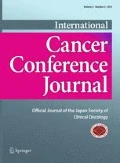Abstract
In breast cancer, leptomeningeal metastasis is increasingly seen in patients with hormone receptor and HER-2-positive disease as the newer therapies used have limited CNS penetration. Leptomeningeal disease is an end-stage presentation usually occurring in tandem with systemic metastases, limiting a patient’s overall survival to 6 months. We present a case with isolated leptomeningeal metastasis as the initial and sole site of recurrence in a patient with early-stage, luminal-type breast cancer. Despite the early stage at diagnosis, this patient recurred within three years likely due to high nodal burden at initial presentation. In the setting of leptomeningeal metastases without intraparenchymal or extracranial disease and good performance status, a patient’s overall survival can be extended longer than the average time span with the use of multiple intrathecal and systemic chemotherapies.


References
Kesari S, Batchelor TT (2003) Leptomeningeal metastases. Neurol Clin 21:25–26
Gauthier H, Guilhaume MN, Bidard FC et al (2010) Survival of breast cancer patients with meningeal carcinomatosis. Ann Oncol 21:2183–2187
Hicks DG, Short SM, Prescott NL et al (2006) Breast cancers with brain metastases are more likely to be estrogen receptor negative, express the basal cytokeratin CK5/6, and overexpress HER2 or EGFR. Am J Surg Pathol 30:1097–1104
Yust-Katz S, Garciaren P, Liu D, Yuan Y et al (2013) Breast cancer and leptomeningeal disease (LMD): hormone receptor status influences time to development of LMD and survival from LMD diagnosis. J Neurooncol 114(2):229–235
Jayson G, Howell A (1996) Carcinomatous meningitis in solid tumors. Ann Oncol 7:773–786
Groves M (2010) New strategies in the management of leptomeningeal metastases. Arch Neurol 67(3):305–312
Rudnicka H, Niwinska A, Murawska M (2007) Breast cancer leptomeningeal metastasis—the role of multimodality treatment. J Neurooncol 84:57–62
Clatot F, Philippin-Lauridant G, Ouvrier MJ et al (2009) Clinical improvement and survival in breast cancer leptomeningeal metastasis correlate with the cytologic response to intrathecal chemotherapy. J Neurooncol 95(3):421–426
De Azevedo CR, Cruz MR, Chinen LT et al (2011) Meningeal carcinomatosis in breast cancer: prognostic factors and outcome. J Neurooncol 104(2):565–572
Jo J-C, Kang MJ, Kim JE et al (2013) Clinical features and outcome of leptomeningeal metastasis in patients with breast cancer: a single center experience. Cancer Chemother Pharmacol 72:201–207
Acknowledgments
The authors are grateful to Kamille West MD, Mount Sinai Beth Israel.
Conflict of interest
The authors declare that they have no conflict of interest.
Author information
Authors and Affiliations
Corresponding author
About this article
Cite this article
Kakani, C., Preeshagul, I.R., Fisher, R. et al. Management of isolated leptomeningeal metastasis as the initial and sole site of recurrence in a patient with early-stage breast cancer. Int Canc Conf J 4, 101–104 (2015). https://doi.org/10.1007/s13691-014-0178-2
Received:
Accepted:
Published:
Issue Date:
DOI: https://doi.org/10.1007/s13691-014-0178-2

